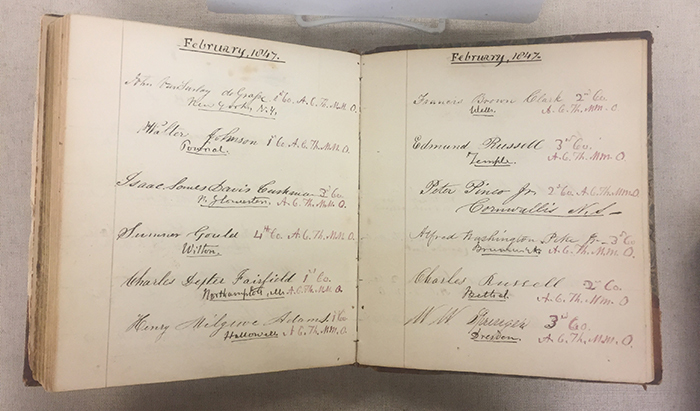Medical School Matriculation Book, 1849-1866. Medical School of Maine Records, Bowdoin College Archives.
Over its one hundred years of existence, the Medical School of Maine trained more than 2,000 doctors, including the second and third African Americans to graduate from an American medical school: John Van Surly DeGrasse and Thomas Joiner White, both Class of 1849. Two other African Americans also attended lectures at the medical school during this period, William Miller Dutton from 1847 to 1848 and Peter Ray in 1848.
Enrollment at the medical school in the 19th century was controlled by the medical faculty and not the administration of Bowdoin College. Students received written permission to attend a series of lectures on medical topics, spread over two six-week terms in the spring semester. Bowdoin students as well as new alumni sometimes attended medical lectures without taking the medical degree. Notable examples include Henry Wadsworth Longfellow, Nathaniel Hawthorne, and John Brown Russwurm, who attended sessions in 1827, making him one of the first Black students to receive formal medical instruction.
The admission of DeGrasse, White, Dutton, and Ray to the Medical School is likely tied to the American Colonization Society’s efforts to educate Black doctors in the United States for work in Liberia. The Maine Medical School had strong ties to the American Colonization Society and its newly formed colonies. The first Governor of the Maryland Colony, James Hall, an 1822 Medical School of Maine graduate, was succeeded in 1836 by his friend John Brown Russwurm. While Hall, Russwurm, and the American Colonization Society seem to have recommended DeGrasse, White, Dutton and Ray to the Maine Medical School, none of the students opted to go to Liberia. The American Colonization Society’s efforts to increase Black doctors in Liberia fared even worse at Harvard. Upon the Society’s request and with its sponsorship, the Harvard Medical School admitted three African Americans in 1850. However, these students were dismissed after tumultuous protests by the other medical students, denying the Black students their medical educations.
Adapted from John Cross’s Whispering Pines: The Medical School of Maine, Liberia, and the American Civil War. October 2012.
